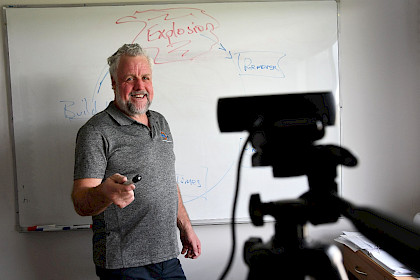Men’s Behaviour Change Program
 At Heavy M.E.T.A.L., we stress that participants generally require 25 to 30 weeks to thoroughly understand and effectively apply the vital components taught in the Phase 1 program. It's important to recognize that our completion assessment is not solely based on attending the minimum number of sessions. Instead, it focuses on consistent weekly attendance, acknowledging and taking responsibility for past abusive behaviour, and actively participating in group discussions. Our program welcomes participants from all over Australia and beyond, with weekly classes conducted via Zoom, ensuring accessibility for everyone.
At Heavy M.E.T.A.L., we stress that participants generally require 25 to 30 weeks to thoroughly understand and effectively apply the vital components taught in the Phase 1 program. It's important to recognize that our completion assessment is not solely based on attending the minimum number of sessions. Instead, it focuses on consistent weekly attendance, acknowledging and taking responsibility for past abusive behaviour, and actively participating in group discussions. Our program welcomes participants from all over Australia and beyond, with weekly classes conducted via Zoom, ensuring accessibility for everyone.
There is no quick fix when it comes to creating long-lasting changes. The process of altering one's behaviour is lengthy, and participation alone does not guarantee positive change. Long-term research indicates that predicting which men will maintain positive changes and for how long is extremely difficult. However, there is evidence that men can and do change their behaviour. This program will significantly benefit you if you are genuinely committed to making a change. Check out the testimonials on our site to see what other participants have to say about their experiences.
Our program consists of three phases:
Phase 1
This phase runs for two Victorian School terms (approximately 20 weeks). During this stage, participants receive support and are challenged to take responsibility for their behaviour. The program is open, allowing participants to join at any time. They learn to break the cycle of violent behaviour. They are encouraged to consider various abusive and controlling acts and the consequences they have on women, children, and the community. In this group, basic skills are taught to improve the safety of others. In the second ten weeks, the program confronts participants' old behaviours and belief systems, addressing a range of destructive behaviours and exploring gender roles. Each participant is challenged to question their attitudes and emotions, leading them to assume greater responsibility for their actions.
Enrolment prerequisites include attending two assessment interviews with David Nugent, which must occur within six weeks of the commencement date.
Phase 2
This phase spans two Victorian school terms, lasting for a semester (approximately 20 weeks). Participants who have shown significant behavioural changes are invited to attend. This evaluation is based on their engagement and dedication to the Phase One Program and feedback from their partners and family members. In this phase, communication skills such as listening, assertiveness, and response techniques are taught and examined. In addition, we provide continuous support to participants and their partners while delving into various topics to improve the participant's well-being.
This phase caters to men who wish to pursue their growth journey and further build upon the progress made in Phase One. The ultimate goal is to establish a strong foundation for the participant's transformed behaviour, enabling them to maintain a safe environment for themselves and their families in the long run.
It's important to note that the focus is not on the number of sessions completed but on acknowledging and taking responsibility for past abusive behaviour and actively participating in group discussions.
Participants attend from all across Australia and beyond, as the weekly classes are held via Zoom.
The prerequisites for this phase include:
- Participating in an assessment session to discuss your readiness and appropriateness for Phase 2
- Demonstrating noticeable changes in behaviour
- On average, being ready for Phase 2 requires attending 25 to 30 weekly sessions of Phase 1
Phase 3
The Phase 3 program, known as the "Grounded and Balanced" Program (G.A.B. program), is accessible to participants across Australia and beyond, thanks to the live weekly Zoom classes.
Groundedness refers to being mentally and emotionally stable, self-aware, and present. A grounded person strongly connects to their sense of self and exhibits inner confidence and balance in various aspects of life. As a result, they are better equipped to handle challenges, stress, and emotional turbulence, maintaining composure and clear thinking during difficult situations. Grounded individuals are also more in tune with their values, beliefs, and emotions, allowing them to make well-informed decisions and maintain healthy relationships with themselves and others. Groundedness is a foundation for personal growth, emotional resilience, and well-being.
Topics discussed in this phase include:
- Life domains
- Identifying personal values
- Vulnerability
- Identifying reasons for hiding behind a mask
- Acceptance
- Compassion
- Judgment
- Money & Finance
- Career & work
- Relationships
- Health & Fitness
- Fun & Leisure
- The ego
- Growth & Learning
- Spirituality and community
- Guilt and Shame
One important topic to explore within groundedness and balance is guilt and shame. Understanding and addressing guilt and shame are essential for personal growth, emotional resilience, and healthy relationships. In addition, exploring these emotions offers several benefits:
- Self-awareness and emotional intelligence: Exploring guilt and shame helps develop self-awareness and emotional intelligence, crucial aspects of groundedness. By understanding the root causes of these emotions and recognizing their triggers, a person can better manage and healthily respond to them.
- Healing and personal growth: Guilt and shame can be deeply rooted in past experiences, unresolved conflicts, or negative belief systems. Confronting and working through these emotions enables healing and fosters personal growth, allowing an individual to move forward with a stronger sense of self.
- Improving relationships: Unresolved guilt and shame can strain relationships, leading to poor communication, defensiveness, and emotional withdrawal. Addressing these emotions can improve one's ability to connect with others, empathize, and engage in open, honest communication, fostering healthier relationships.
- Reducing self-sabotage: Guilt and shame can lead to self-sabotaging behaviours, as individuals may feel undeserving of success, happiness, or healthy relationships. By exploring and addressing these emotions, a person can break free from self-destructive patterns and work towards achieving their goals.
- Developing self-compassion: Understanding guilt and shame allows one to cultivate self-compassion, a key component of groundedness and balance. Self-compassion involves accepting oneself, recognizing that everyone makes mistakes, and treating oneself with kindness during difficult times.
- Enhancing emotional resilience: Exploring guilt and shame enhances emotional resilience by teaching individuals how to cope with challenging emotions, adapt to change, and recover from setbacks.
By addressing guilt and shame, a man can cultivate a more balanced and grounded state of being, leading to a healthier and more fulfilling life. This emotional work allows for personal growth, improved mental well-being, and the ability to navigate life's challenges with resilience and self-assurance. Ultimately, exploring and understanding guilt and shame contributes to developing a stronger sense of self, enabling a man to become a better partner, father, and role model within his community.
The program runs exclusively via Zoom on Tuesdays from 6:30 pm to 8:30 pm, allowing participants from distant locations across Australia and beyond to attend.
To join the G.A.B Program, you must have completed a minimum of 40 weeks of the Phase 2 program. In addition, participants who haven't attended the Phase 2 program within the previous three months are required to undergo an assessment session.
Couples Program
 For those women who have completed three terms of the women’s group and whose partners have completed Phase 2, we offer a special workshop over the course of ten evenings. Participants learn effective communication skills, positive ways of responding to one another, reflective listening and how to assertively deal with criticism.
For those women who have completed three terms of the women’s group and whose partners have completed Phase 2, we offer a special workshop over the course of ten evenings. Participants learn effective communication skills, positive ways of responding to one another, reflective listening and how to assertively deal with criticism.
Conflicts and difficulties are almost inevitable in any relationship. It’s not the arguments that are bad for your relationship, it’s how you handle conflict that will either help your relationship to grow or see it come to an end. In this program, participants are taught to respond to each other and stay focused on the concern that has been raised rather than become side-tracked with other issues.
 Programs for Schools
Programs for Schools
I am passionate about bringing change in our society, as I believe very strongly that change is possible. In my work with men and families, there has been a common theme in regards to changing learned behaviour.
This theme is connected with the impact that role models have had on participant's lives. These role models have melded this behaviour, which has led to problems in adulthood. Problems associated with relationships, communication, self-esteem, confidence, expressing emotions, conflict resolution etc and the list goes on. This is why I believe young men need to experience positive role models.
The programs that I have been running for young boys at schools over the last twelve years encourage boys to get in tune with themselves, their family and their lives so that they may enter adulthood with self-awareness and a good understanding of the importance of equality.
These programs have received a lot of positive recognition from the schools that have taken part. More importantly there has been regular positive feedback from students, teachers and parents. Testimonials (including video testimonials) and references can be provided to support this.
The programs are:
- behaviour change classes
- building a model aeroplane and installing petrol engine
- Rock and Water Classes
- Young Eagles Program
- individual counselling for both student and parents
Behaviour Change Program
This program aims at encouraging young boys to have positive social goals, skills and motivation. These skills include
- self-awareness
- self-management (ie through stress management techniques)
- impulse control
- active listening
- empathy
- the ability to understand non-verbal cues
- conflict resolution with teachers, parents and other students
- mediation
Without self-awareness, it is impossible to manage our behaviour and actions effectively.
Model Aeroplane Program
This program is aimed at building self-esteem and self-worth in a fun way. I feel the deepest need of all, the core emotional need of the human being, is for self-esteem. It is to feel respected and worthwhile. It is to be liked and valued by others, particularly when part of a team. This program has a strong emphasis on team building and working together to achieve the end goal. Some of the student behaviours that are challenged include:
- being aggressive
- blocking or nit-picking
- competing
- clowning or joking to disrupt the work of the group
- withdrawing
- being sarcastic or cynical
- blaming
- taking all the credit
- dominating
- manipulating
The program has had a lot of success in transforming participants negative behaviours as they come to understand and learn the values, skills and behaviours required to successfully collaborate and complete a group project.
Rock and Water Program
This program encourages boys to stand stronger in many ways. As important parts of communication they learn to sense, set and defend their own boundaries in an appropriate manner, particularly in peer pressure situations. They also learn to respect others' boundaries, especially those expressed by girls. The boys learn how to use their imaginations and positive thinking and how this empowers them and helps to achieve their goals.
The boys learn some basic self-defence skills in order to teach them how to control and develop their power. This physical approach demands discipline and perseverance, as well as teaching the boys how to deal with conflict while maintaining self-control. The Rock and Water program at secondary level addresses:
- standing strong with rock and water attitude
- mental power
- awareness of boundaries
- empathic feeling
- intuition training
- prevention of sexual violence
- dealing with peer pressure
- homophobia
- body language and group dynamics
- success strategies
- expressing respect to others
The program is very active with lots of physical exercises alternated with group-discussions. Each lesson is supported with questions and simple assignments in order to make a successful integration with every day-life.
Young Eagles Program
This program is an incentive for those students who have completed the Behaviour Change and Model Group program and have demonstrated their commitment by completing the weekly behaviour card.
As a pilot, I have organised for these students to participate in the Royal Victorian Young Eagles Program at Moorabbin airport, culminating in a demonstration flight in a plane. These flights are provided free of charge. As a pilot, I want to share the exhilaration and freedom of flight with these young men. Aviation has been an overwhelmingly positive experience in my life and my hope is that the experience will spark the participant's curiosity to learn more about this field. A Young Eagle will also come to see and understand - as seen above through the eyes of an eagle - the true potential of life that lies beyond their everyday surroundings and that they can reach their goals through hard work and dedication.
Individual Counselling
Individual counselling has been very empowering for both students and parents, particularly around issues associated with family conflict and violence. Over the years I have been able to encourage parents to engage with my adult programs which are run in the evenings. This has been particularly helpful for families where there has been police and Child Protection involvement. There is further information regarding this on the web site.
If you feel your school may be interested engaging

